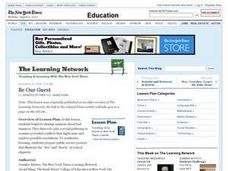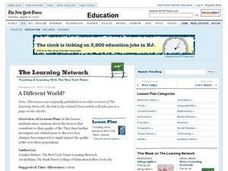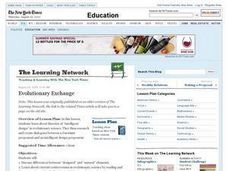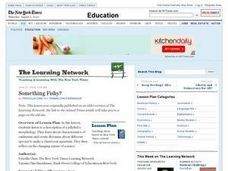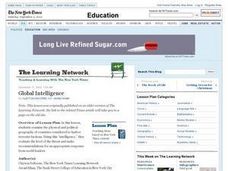Curated OER
Be Our Guest
Students share their own opinions about proper and poor etiquette in school. After reading an article, they discover matters of etiquette and conflict that occur during holiday rituals. They role-play the potential conflicts and...
Curated OER
A Different World?
Students share their opinions in a brainstorming session on the factors that contribute to their quality of life. They read the article "Life Is Better; It Isn't Better. Which Is It?," from the NY Times and discuss the article as a...
Curated OER
Evolutionary Exchange
Students discuss the difference between designed and natural elements. After reading an article, they discover information about current controversies in evolutionary science. In groups, they research and write dialogues between two...
Curated OER
Something Fishy?
Students try to draw and identify a jellyfish from a physical description. After reading an article, they discover new information about cnidarians. In groups, they research and develop dioramas about a specific cnidarian species. They...
Curated OER
Summer Bummers
Brainstorm popular summer activities and their risks after having your class read an article. They will discover the risks of sun overexposure and in groups develop public service announcements for young people. They also propose a media...
Curated OER
Who Gives a Hoot?
Learners look at owl migration and its impact on the environment and the food chain after reading an article from The New York Times. Students then apply this information to and research different food chain situations for other species...
Curated OER
Eyeing the Next Einstein
Students complete a KWL chart on Albert Einstein. After they read an article, they discover more about his iconic status and how future scientists view him. In groups, they create trading cards about Einstein and another scientist of...
Curated OER
Discoveries of Titanic Proportions
Young scholars analyze various statements on the moon. After reading an article, they discuss the findings about a new moon around Saturn. In groups, they re-create a press conference in which the new findings were released to the...
Curated OER
DNA-B-C's
Young scholars review what they already know about DNA. After reading an article, they discover a new technique to map the course of evolution. In groups, they create ways to present this material to younger children and research DNA's...
Curated OER
A Site to See
Students identify the risks and benefits of living next to a volcano. After reading an article, they discuss the behaviors of an active volcano. Using the Internet, they work together to research volcano-monitoring techniques and create...
Curated OER
Gunshots by the Numbers
Students analyze the incidence of gun injuries among children and what can be done about it by reading and discussing the article "Keeping Guns Out of Children's Hands." They convert statistics about gun injuries into visual...
Curated OER
Science on the Skids
Students discuss the decline in the sciences in America by comparing statistics and information from the U.s. to other countries. Then they write and deliver a "State of the Sciences" address to their peers.
Curated OER
A Historic Gamble
Young scholars explore and evaluate the economic impact of legalized gambling on Native American Indian communities. They draft short, persuasive speeches that take the perspective of a tribal elder appearing at a town council meeting.
Curated OER
Heightening Awareness
Students review their prior knowledge about Haiti. They examine violence in Haiti by reading and discussing "HAITIAN FORCES BATTLING UPRISING REPORT RETAKING 3 TOWNS." In groups, students research specific time periods of Haitian history...
Curated OER
Breezy, Chilly, or Freezing?
Students assess the factors which influence the sensation of being "cold" in a particular situation. They study the complexities in measuring temperature by reading and discussing the article "Beyond Brrr: The Elusive Science of...
Curated OER
Navigating the Straits
Young scholars research the players and events that have influenced U.S.-China relations since World War II, with specific emphasis on the two countries' relationships with Taiwan. They write a briefing paper, advising the president on...
Curated OER
Plasma 101
Students examine the definitions and characteristics of plasma. After reading an article, they analyze new technologies to study plasma. In groups, they create a poster on how the different types of plasma work and write letters to their...
Curated OER
Tangled Text
Students list different forms of communication, assess importance of writing, read and discuss article "String, and Knot, Theory of Inca Writing", research system of writing, and create "How It Works" posters.
Curated OER
Changing of the Guard
Learners reflect on their knowledge of democracy. After reading an article, they examine current plans for the placement of a democracy in Iraq. In groups, they research past regime changes and democratization attempts and discuss the...
Curated OER
Everyday Objects
Students reflect in their journals about an everyday object they take for granted. After reading an article, they examine what a cook's tools can reveal about their life. In groups, they research everyday objects and write a museum...
Curated OER
Global Intelligence
Students discuss the war in Afghanistan and the conditions surrounding the hunt for Osama bin Laden after reading the article "Bin Laden and Omar: Far Harder to Find" from The New York Times. After the class discussion, students...
Curated OER
Food's Altered Ego
Students write in their journals where they believe food comes from. After reading an article, they examine the proceses of cultivation and sale of genetically modified foods. Using the internet, they research specific countries and...
Curated OER
Team Works
Students define "group" and list American social and political movements throughout history. They examine one model of a successful team and positive group mentality by reading and identify the traits of a successful group and those of...
Curated OER
Taking the Witness Stand
Students identify a pivotal event in world history that they would have liked to have witnessed. They then research this event and write a first-person account of it as if they had been present. Their first-prerson account is modeled...


